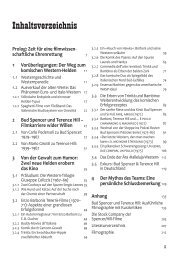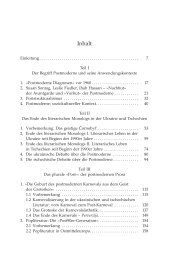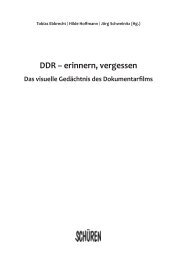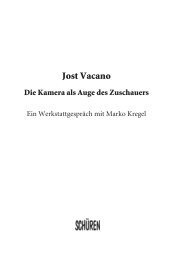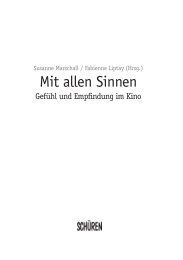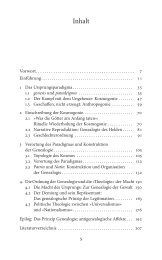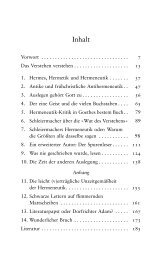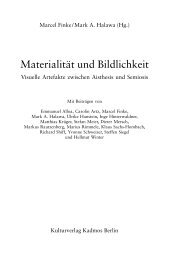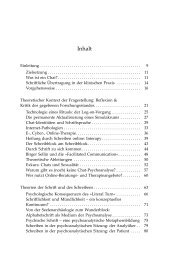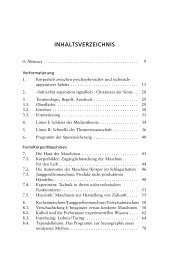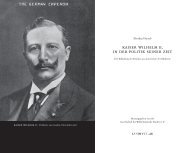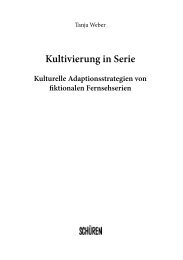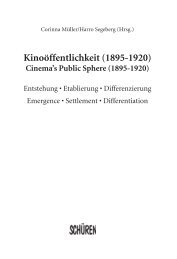- Seite 1 und 2:
I. Anmerkungen zum Buchtext, Teil I
- Seite 3 und 4:
zusammen mit dem Tierfilm TIERKINDE
- Seite 5 und 6:
verstimmt über «das schnelle Abro
- Seite 7 und 8:
109 Crowther, Bruce: Laurel & Hardy
- Seite 9 und 10:
140 Der ilm Nr.11 vom 14.März 1931
- Seite 11 und 12:
Kapitel 11 176 siehe Mitchell, a.a.
- Seite 13 und 14:
Kapitel 12 207 U.a. wird die Existe
- Seite 15 und 16:
253 Länge nunmehr 1.580 m.Warum ab
- Seite 17 und 18:
Kurzfilme von Laurel und Hardy behi
- Seite 19 und 20:
Blatt einer Kreissäge) und DIRTY W
- Seite 21 und 22:
Menge sehr netter Einfälle und gei
- Seite 23 und 24:
Kapitel 17 X Nach Spieker, a.a.O.,
- Seite 25 und 26:
II. Anmerkungen zum Buchtext, Teil
- Seite 27 und 28:
«Ulk und Albernheit am laufenden B
- Seite 29 und 30:
65 Filmblätter Nr. 38 vom 18. Nove
- Seite 31 und 32:
«Wiederaufführung 1950». Interes
- Seite 33 und 34:
174 Film-Echo Nr. 36 vom 7. Oktober
- Seite 35 und 36:
220 Film-Echo Nr. 21 vom 20. Juli 1
- Seite 37 und 38:
271 Interview Laurel Without Hardy
- Seite 39 und 40:
chige Arbeitskopie zu Beginn der Ar
- Seite 41 und 42:
397 Filmwoche Nr. 12 vom 22. März
- Seite 43 und 44:
455 Pietreks Schreiben als Verleih-
- Seite 45 und 46:
505 Prüf-Nr. 5.310, 5.311 (DER KÖ
- Seite 47 und 48:
561 Kritik in: Film-Echo Nr. 45 vom
- Seite 49 und 50:
Kapitel 5 II Siehe Werberatschlag z
- Seite 51 und 52:
III. Anmerkungen zum Buchtext, Teil
- Seite 53 und 54:
46 ilmblätterNr. 42 vom 18. Oktobe
- Seite 55 und 56:
119 Werbung des NWD mit Stimmen aus
- Seite 57 und 58:
hervorragenden Bildqualität zu erk
- Seite 59 und 60:
220 Der Kurier, Berlin-West, Ausgab
- Seite 61 und 62:
260 z.B.: Deutsche Saar, Ausgabe vo
- Seite 63 und 64:
deutschen Premiere von SPASS MUSS S
- Seite 65 und 66:
362 Darmstädter Echo, Ausgabe vom
- Seite 67 und 68:
lerdings drastisch gekürzt und mit
- Seite 69 und 70:
tausch und ilm - Unterhaltung -, Pr
- Seite 71 und 72:
515 ilmobibliografischer Jahresberi
- Seite 73 und 74:
559 Pforzheimer Kurier, Ausgabe vom
- Seite 75 und 76:
615 Angabe nach Anzeige des Eckelka
- Seite 77 und 78:
673 Heidenheimer Zeitung, Ausgabe v
- Seite 79 und 80:
733 ilm-Sonderdienst Ott Nr. 59-61
- Seite 81 und 82:
IV. Anmerkungen zum Buchtext, Teil
- Seite 83 und 84:
Kapitel 5 57 Wolfram Schroeder zu L
- Seite 85 und 86:
Laurels geschiedene Frau Virginia R
- Seite 87 und 88:
128 Bild und Funk vom 13. März 197
- Seite 89 und 90:
pathé eingeflickt hatte. - Es geht
- Seite 91 und 92:
Kapitel 16 208 Blees, Christian in:
- Seite 93 und 94:
Deutsches Plakat von 1951 für ATOL
- Seite 95 und 96:
chronisation und der Angaben zum St
- Seite 97 und 98:
Schmalfilm-Verleih 1: MGM, ab 1973/
- Seite 99 und 100:
Sprecher: Hans Jürgen Diedrich TV:
- Seite 101 und 102:
1927 LOVE ‘EM AND WEEP Arbeitstit
- Seite 103 und 104:
Produktion: Beta Film, München; Pr
- Seite 105 und 106:
3. August 1967, ab 6, nff; Trailer-
- Seite 107 und 108:
TV: 26. November 1976, ZDF DVD 1.1:
- Seite 109 und 110:
8. MIT DEM PINSEL IN DER HAND synch
- Seite 111 und 112:
Synchronstudio: Beta Technik, Münc
- Seite 113 und 114:
5. DO DETECTIVES THINK? Originalfas
- Seite 115 und 116:
Video 1.1: Taurus-Video GmbH; Video
- Seite 117 und 118:
Synchronstudio: Beta Technik, Münc
- Seite 119 und 120:
5. DICK UND DOOF BEIM ZAHNARZT Best
- Seite 121 und 122:
Länge: 2 Rollen; stumm; Drehbuch f
- Seite 123 und 124:
Sprecher: Werner Schwier (Erklärer
- Seite 125 und 126:
Hinweis: Diese Fassung stand nicht
- Seite 127 und 128:
Hinweis: Braff, 581: UA: 1. April 1
- Seite 129 und 130:
12. DER BELEIDIGTE BLÄSER synchron
- Seite 131 und 132:
Sprecher: Hanns Dieter Hüsch TV: 1
- Seite 133 und 134:
Produzent: Hal Roach, für MGM Dist
- Seite 135 und 136:
deutsche Veröffentlichungen: 1. DI
- Seite 137 und 138:
c) Video 1.1: Taurus-Video GmbH; Be
- Seite 139 und 140:
DE: 9. März 1973, Berlin/DDR; sync
- Seite 141 und 142:
5. LAUREL UND HARDY IM FLEGELALTER
- Seite 143 und 144:
3. IM 6. HIMMEL Standort: Unbekannt
- Seite 145 und 146:
1929 WRONG AGAIN Arbeitstitel: JUST
- Seite 147 und 148:
Synchronstudio: BSG, Berlin; Produk
- Seite 149 und 150:
2. DAS GANZ GROSSE GESCHÄFT mit Zw
- Seite 151 und 152:
10. EIN TOLLPATSCH KOMMT SELTEN ALL
- Seite 153 und 154:
Synchronstudio: VEB DEFA Studio fü
- Seite 155 und 156:
Hinweis: Remake der Schlafwagen-Sze
- Seite 157 und 158:
DVD 1: Kinowelt Home Entertainment
- Seite 159 und 160:
deutsche Veröffentlichungen: 1. DI
- Seite 161 und 162:
Sprecher: Hanns Dieter Hüsch TV: 1
- Seite 163 und 164:
MGM-Studios, Culver City; UA: 23. N
- Seite 165 und 166:
CD-ROM: Taurus-Video GmbH; Bestell-
- Seite 167 und 168:
Produzent: Hal Roach, für MGM; Buc
- Seite 169 und 170:
4. BLOTTO Originalfassungen; Stando
- Seite 171 und 172:
deutsche Veröffentlichungen: 1. DI
- Seite 173 und 174:
1930 GLÜCKLICHE KINDHEIT deutsche
- Seite 175 und 176:
Sprecher: Andreas Mannkopff (Stan L
- Seite 177 und 178:
Video 3.1: Taurus-Video GmbH; Beste
- Seite 179 und 180:
DE: 19. Juni 1958, Filmtheater am B
- Seite 181 und 182:
1930 SPUK UM MITTERNACHT deutsche S
- Seite 183 und 184:
Hinweis: Remake von DUCK SOUP. Die
- Seite 185 und 186:
deutsche Veröffentlichungen: 1. ZW
- Seite 187 und 188:
deutsche Veröffentlichungen: 1. SO
- Seite 189 und 190:
Produzent: Pat Casey für National
- Seite 191 und 192:
TV 2: 23. November 1979, ZDF; Aussc
- Seite 193 und 194:
1931 LES CAROTTIERS französische S
- Seite 195 und 196:
5. MENSCHEN UND ROMANTIK Ausschnitt
- Seite 197 und 198:
DE: zwischen 2. Januar und 14. Febr
- Seite 199 und 200:
1931 DE BOTE EN BOTE Titel in Mexik
- Seite 201 und 202:
1931 COME CLEAN Inhaltsangabe Seite
- Seite 203 und 204:
1931 ONE GOOD TURN Inhaltsangabe Se
- Seite 205 und 206:
8. ONE GOOD TURN Originalfassungen;
- Seite 207 und 208:
Live-Sprecher: ?; Live-Musik am Pia
- Seite 209 und 210:
DE: ab 5. Juni 1935; untertitelt; L
- Seite 211 und 212:
(Laurels Ringhilfe), Dick Gilbert (
- Seite 213 und 214:
Sprecher: Andreas Mannkopff (Stan L
- Seite 215 und 216:
Video 4.1: Taurus-Video GmbH; Beste
- Seite 217 und 218:
TV 2: 29. Dezember 1972, ZDF; Aussc
- Seite 219 und 220:
DVD 2: Kinowelt Home Entertainment
- Seite 221 und 222:
27.037-a, 4. September 1962, ab 6,
- Seite 223 und 224:
Synchronstudio: IFU, Remagen; Produ
- Seite 225 und 226:
-), Paul Bürks (Frank Rice), Marti
- Seite 227 und 228:
Sprecher: Walter Bluhm (Stan Laurel
- Seite 229 und 230:
3. DICK UND DOOF KAUFEN EIN SCHIFF
- Seite 231 und 232:
DE: 2. Oktober 1959, Metropol-Theat
- Seite 233 und 234:
als Einzelfilm: Verleih: Donau; FSK
- Seite 235 und 236:
Sprecher: Walter Bluhm (Stan Laurel
- Seite 237 und 238:
DE: 20. März 1956, als Bestandteil
- Seite 239 und 240:
Video 1.2: Atlas Film + AV GmbH & C
- Seite 241 und 242:
Hinweis: Trickvorspann mit blubbern
- Seite 243 und 244:
deutsche Veröffentlichungen: 1. DI
- Seite 245 und 246:
d) Video 1.1: Taurus-Video GmbH; Be
- Seite 247 und 248:
5. EIN TOLLPATSCH KOMMT SELTEN ALLE
- Seite 249 und 250:
3. DICK UND DOOF AUF KRUMMEN WEGEN
- Seite 251 und 252:
4. THEM THAR HILLS Originalfassunge
- Seite 253 und 254:
DE: ca. Juni 1966; Verleih: NWDF-Un
- Seite 255 und 256:
6. THE LIVE GHOST Originalfassungen
- Seite 257 und 258:
5. DICK UND DOOF IM ELEKTROLADEN Or
- Seite 259 und 260:
Juli 2003, oA; geprüft und freigeg
- Seite 261 und 262:
Mary Gordon (Mrs. Bickerdyke, Wirti
- Seite 263 und 264:
1936 THE BOHEMIAN GIRL Inhaltsangab
- Seite 265 und 266:
Video 1.1: Taurus-Video GmbH; Beste
- Seite 267 und 268:
deutsche Veröffentlichungen: 1. DI
- Seite 269 und 270:
ney Toler), Gernot Duda (John Kelly
- Seite 271 und 272:
Synchronstudio: IFU, Remagen; Produ
- Seite 273 und 274:
6 kolorierte Ausschnitte in der Zus
- Seite 275 und 276:
1938 SWISS MISS Arbeitstitel: SWISS
- Seite 277 und 278:
Video 2: Kinowelt Home Entertainmen
- Seite 279 und 280:
Synchronstudio: IFU, Remagen; Produ
- Seite 281 und 282:
TV: 27. Dezember 1999, arte; Zweika
- Seite 283 und 284:
Kommentare: Helmut Harun Sprecher d
- Seite 285 und 286:
10, nff; Verleih 10: NWDF; FSK: 2.1
- Seite 287 und 288:
DVD: Kinowelt Home Entertainment Gm
- Seite 289 und 290:
4. IMMER WENN ER HUPEN HÖRTE synch
- Seite 291 und 292:
Synchronstudio: Ultra Synchron OHG,
- Seite 293 und 294:
1943 THE TREE IN A TEST TUBE Inhalt
- Seite 295 und 296:
deutsche Veröffentlichungen: 1. JI
- Seite 297 und 298:
ert Mitchum), Fred Maire (Robert Ba
- Seite 299 und 300:
(Doolittle), Charles Irwin (Entfüh
- Seite 301 und 302:
Sprecher: Walter Bluhm (Stan Laurel
- Seite 303 und 304:
VI. ilmografie der Solofilme von La
- Seite 305 und 306:
Länge: 2 Rollen; stumm; Drehort: B
- Seite 307 und 308:
Sprecher: Georg Thomalla Hinweis: D
- Seite 309 und 310:
Inhalt: Nachdem West in der Küche
- Seite 311 und 312:
Sprecher: Hartmut Neugebauer TV: 12
- Seite 313 und 314:
deutsche Veröffentlichung: DO YOU
- Seite 315 und 316:
Standort: Unbekannt DE: ab 17. Juli
- Seite 317 und 318:
Inhalt: Aubrey ist Mieter in Hardys
- Seite 319 und 320:
Video: VPS, München; Bestell-Nr. 2
- Seite 321 und 322:
Hinweis: Diese assung stand nicht z
- Seite 323 und 324:
2. LARRY DER KULISSENSCHIEBER synch
- Seite 325 und 326:
5. GOL unsynchronisierte olge der S
- Seite 327 und 328:
Johnson Larry Semon, den Titel THE
- Seite 329 und 330:
Hinweis: Remake von Laurels Solofil
- Seite 331 und 332:
Synchronstudio: Beta Technik, Münc
- Seite 333 und 334:
Hinweis: Vorname von Katherine Gran
- Seite 335 und 336:
4. EINE GRÜNDLICHE HERRENWÄSCHE s
- Seite 337 und 338:
6. LIEBE, LUST UND LEIDENSCHAT sync
- Seite 339 und 340:
deutsche Veröffentlichungen: 1. LA
- Seite 341 und 342:
Produktion: Jack Saunders für Nati
- Seite 343 und 344:
2. DER GROSSWILDJÄGER unsynchronis
- Seite 345 und 346:
deutsche Veröffentlichung: DIE BAL
- Seite 347 und 348:
5. EIN SACHLICHES GESPRÄCH synchro
- Seite 349 und 350:
nähere Einzelheiten unbekannt TV:
- Seite 351 und 352:
ückzuholen und doch noch freizumac
- Seite 353 und 354:
deutsche Veröffentlichungen: 1. DA
- Seite 355 und 356:
) DVD: Kinowelt Home Entertainment
- Seite 357 und 358:
deutsche Veröffentlichungen: 1. IM
- Seite 359 und 360:
Produktion: Eclipse; Untertitel: Ra
- Seite 361 und 362:
Inhalt: Ein kleines Mädchen lässt
- Seite 363 und 364:
Sprecher: Werner Schwier (Erklärer
- Seite 365 und 366:
Sprecher: Hanns Dieter Hüsch TV: 5
- Seite 367 und 368:
deutsche Veröffentlichungen: 1. IM
- Seite 369 und 370:
3. DER LÜSTLING UND DIE ALSCHE DAM
- Seite 371 und 372:
2. ISN’T LIE TERRIBLE? Originalfa
- Seite 373 und 374:
überwindet er nach und nach seine
- Seite 375 und 376:
mon das Mitleid und zahlt für ihn
- Seite 377 und 378:
Darsteller: Glenn Tyron (Casper Cru
- Seite 379 und 380:
Synchronstudio: Beta Technik, Münc
- Seite 381 und 382:
1926 CRAZY LIKE A OX Länge: 2 Roll
- Seite 383 und 384:
Straße, vor die üße der rau des
- Seite 385 und 386:
Inhalt: Chase’s Chef wird gewahr,
- Seite 387 und 388:
Darsteller: Mabel Normand (Paddy),
- Seite 389 und 390:
Länge: 2 Rollen; stumm; Drehzeit:
- Seite 391 und 392:
DE: in der Zeit vom 24. Juni bis zu
- Seite 393 und 394:
Produzent: Hal Roach, für Hal Roac
- Seite 395 und 396:
(Zero), Hattie McDaniel (Dehlia), P
- Seite 397 und 398:
deutsche Veröffentlichung: LACH UN
- Seite 399 und 400:
1960 WHEN COMEDY WAS KING Zusammens
- Seite 401 und 402:
DE: 31. Mai 1963, Kristallpalast (D
- Seite 403 und 404:
Hinweis: Diese Fassung stand nicht
- Seite 405 und 406:
DE: zwischen 2. Januar und 14. Febr
- Seite 407 und 408:
in ANY OLD PORT), Joachim Cadenbach
- Seite 409 und 410:
1960/61), DICK UND DOOF BAUEN EIN G
- Seite 411 und 412:
BSG, 1965), DAS UNFERTIGE FERTIGHAU
- Seite 413 und 414:
Österreichisches Kinoplakat von 19
- Seite 415 und 416:
DE: -; Ö-Interessentenvorführung:
- Seite 417 und 418:
estehend aus den Kurzfilmen OLIVER
- Seite 419 und 420:
) Synchronisation der übrigen drei
- Seite 421 und 422:
c) BESSERE HERREN SUCHEN ANSCHLUSS:
- Seite 423 und 424:
Synchronstudio: BSG, Berlin; Produk
- Seite 425 und 426:
a) THE FLYING DEUCES DE: 30. Januar
- Seite 427 und 428:
1967 DIE ANTENNE = DICK UND DOOF BA
- Seite 429 und 430:
Synchronstudio: BSG, Berlin; Produk
- Seite 431 und 432:
DE: 13. Oktober 1953, Rixi-Filmthea
- Seite 433 und 434:
Programm 24: SAPS AT SEA außerdem
- Seite 435 und 436:
1992 HAL ROACH ZUM 100. GEBURTSTAG
- Seite 437 und 438:
kurze Ausschnitte aus diversen Kom
- Seite 439 und 440:
IX. Laurel-und-Hardy-Filme in den G
- Seite 441 und 442:
(ohne deutschen Titel) The Snow Haw
- Seite 443 und 444:
Bob und sein Konkurrent The Gown Sh
- Seite 445 und 446:
Sendetitel Originaltitel Hauptdarst
- Seite 447 und 448:
Die Geldgierigen - a) Bacon Grabber
- Seite 449 und 450:
Phase 5 10 Folgen, 3. März 1972 bi
- Seite 451 und 452:
Die entlaufene Prinzessin: Hände i
- Seite 453 und 454:
1974 Grips und Tricks Standort: Unb
- Seite 455 und 456:
Hinweis: Die Serie beinhaltet mit e
- Seite 457 und 458:
Ein flotter Schürzenjäger A Man A
- Seite 459 und 460:
Große Kaliber Great Guns Dick und
- Seite 461 und 462:
1979 bis 1980 Meisterszenen mit Sta
- Seite 463 und 464:
a) Auf krummen Wegen b) Gehen vor A
- Seite 465 und 466:
andere Solofilme mit Laurel und Har
- Seite 467 und 468:
Bartlett, Martin Hendes; Bildschnit
- Seite 469 und 470:
Smithy Smithy / Laurel, James Finla
- Seite 471 und 472:
TV: 53 Folgen, 5. Juli 1997 bis 27.
- Seite 473 und 474:
Deutsches Kinoplakat von 1953 für
- Seite 475 und 476:
1965 EIN ABEND MIT DICK UND DOO Kur
- Seite 477 und 478:
1972 LAUREL UND HARDY SUCHEN ANSCHL
- Seite 479 und 480:
Produktion: Bayerischer Rundfunk; R
- Seite 481 und 482:
1989 DER KOMISCHSTE MANN DER WELT (
- Seite 483 und 484:
1995 ALS DAS LACHEN LAUEN LERNTE (Q
- Seite 485 und 486:
1999 DIE BESTE COMEDY die Jahrhunde
- Seite 487 und 488:
TV: 7. August 2004, BR3 Bericht: Ch
- Seite 489 und 490:
DE: 12. September 1952, Rex-ilmthea
- Seite 491 und 492:
Synchronstudio: Ultra Synchron OHG,
- Seite 493 und 494:
weitere Sprecher: Klaus Schwarzkopf
- Seite 495 und 496:
26. DICK UND DOO ALS MITGITJÄGER (
- Seite 497 und 498:
17.035, 19. Mai 1958, ab 6, nff; SK
- Seite 499 und 500:
1974 DICK UND DOO UND DIE RAUEN ab
- Seite 501 und 502:
Schmalfilm-Verleih 1: Atlas-Schmalf
- Seite 503 und 504:
DE: -, nur Schmalfilm; untertitelt;
- Seite 505 und 506:
XII. ilmografie der in Deutschland
- Seite 507 und 508:
Synchronstudio: Beta Technik, Münc
- Seite 509 und 510:
Mitte 1980er-Jahre DICK UND DOO 3 K
- Seite 511 und 512:
Ende 1980er-Jahre DICK UND DOO IM S
- Seite 513 und 514:
Anfang 1990er-Jahre KINTOP PARADE 1
- Seite 515 und 516:
ney Toler), Gernot Duda (John Kelly
- Seite 517 und 518:
Sprecher: Theo Lingen (Einleitung);
- Seite 519 und 520:
DERSEA KINGDOM; R. Reeves Easton, U
- Seite 521 und 522:
TV: 23. Juni 1976, ZD; in der Reihe
- Seite 523 und 524:
DE: 14. Juli 1967, Corso-Theater (W
- Seite 525 und 526:
WAY OUT WEST, SAPS AT SEA, HELPMATE
- Seite 527 und 528:
1994 WIR SIND VOM SCHOTTISCHEN INAN
- Seite 529 und 530:
Video: Bestell-Nr. 1310; VÖ: 7. Ju
- Seite 531 und 532:
a) THE LAUREL AND HARDY MURDER CASE
- Seite 533 und 534:
DVD: Kinowelt Home Entertainment Gm
- Seite 535 und 536:
a) WHY GIRLS LOVE SAILORS: Musik: B
- Seite 537 und 538:
1995 WE AW DOWN, LIBERTY Originalfa
- Seite 539 und 540:
estehend aus 4 TV-olgen der Serie K
- Seite 541 und 542:
mit den Kurzfilmen TOWED IN A HOLE,
- Seite 543 und 544:
c) aa) TIT OR TAT, Originalfassung;
- Seite 545 und 546:
c) EARLY TO BED, Originalfassung, M
- Seite 547 und 548:
2001 IN OXORD Standort: KirchMedia/
- Seite 549 und 550:
) aa) ANY OLD PORT, Originalfassung
- Seite 551 und 552:
d) Trailer WISSEN IST MACHT (A CHUM
- Seite 553 und 554:
TV: 18. ebruar 1972, ZD; olge der S
- Seite 555 und 556:
2002 DVD-Box in limitierter Sonderv
- Seite 557 und 558:
d) GRAND HOTEL, ilmaufnahmen von J.
- Seite 559 und 560:
Sprecher: Walter Bluhm (Stan Laurel
- Seite 561 und 562:
d) aa) OUR WIE, Originalfassung; SK
- Seite 563 und 564:
DVD 1: Bestell-Nr. CMLH 001 a) LUCK
- Seite 565 und 566:
c) HIS WOODEN WEDDING (Charley Chas
- Seite 567 und 568:
weitere geplante DVD-Veröffentlich
- Seite 569 und 570:
BELEIDIGTE BLÄSER, DER (TV) YOU’
- Seite 571 und 572:
DICK UND DOOF ERBEN EINE INSEL ATOL
- Seite 573 und 574:
DUELL, DAS (Ö, Vorkrieg; S, Nachkr
- Seite 575 und 576:
IHR KÖNNT MIR MAL WAS BLASEN YOU
- Seite 577 und 578:
MATROSEN IM HEMD (TV, Einzeltitel e
- Seite 579 und 580:
SPION AM STRICK, DER (TV,Einzeltite
- Seite 581 und 582:
ZAUBERLEHRLINGE, DIE (Ö) A-HAUNTIN
- Seite 583 und 584:
XIV. Übersicht über die deutschen
- Seite 585 und 586:
KRAGEN UND MANSCHETTEN (TV) COLLARS
- Seite 587 und 588: WENN DIE LÖWEN LACHEN (TV) ROUGHES
- Seite 589 und 590: XV. Übersicht über Laurel und Har
- Seite 591 und 592: The Laurel & Hardy Murder Case Belo
- Seite 593 und 594: Sugar Daddies Zwischen Bestien und
- Seite 595 und 596: The Live Ghost Gespenst an Bord = D
- Seite 597 und 598: With Love and Hisses Käse mit Knob
- Seite 599 und 600: Way Out West Dick und Doof im Wilde
- Seite 601 und 602: Going Bye-Bye! Der große ang = Dic
- Seite 603 und 604: Towed In A Hole Dick und Doof kaufe
- Seite 605 und 606: XVI. Übersicht über die Kinos (mi
- Seite 607 und 608: Lange Leitung Blockheads W.B.T.-Lic
- Seite 609 und 610: Dick und Doof die Schwerenöter Bea
- Seite 611 und 612: Dick und Doof wie immer auf eigene
- Seite 613 und 614: Deutsches Plakat von 2003 zum Kabar
- Seite 615 und 616: WIR SIND VOM SCHOTTISCHEN INFANTERI
- Seite 617 und 618: XVIII. Quiz-Fragen zu Laurel und Ha
- Seite 619 und 620: 13. Was will der Küchenchef in SWI
- Seite 621 und 622: 2. Hier im Bild sehen wir Oliver Ha
- Seite 623 und 624: XIX. Antworten auf die Quiz-ragen A
- Seite 625 und 626: * Als Alles oder nichts ausgestrahl
- Seite 627 und 628: XX. Adressen der deutschen Laurel-u
- Seite 629 und 630: XXI. English Summary or Internation
- Seite 631 und 632: The next appearances of the emergin
- Seite 633 und 634: Some dialogue modifications were im
- Seite 635 und 636: Bluhm was born on August 5, 1907 in
- Seite 637: Keaton has meanwhile resurfaced (CA
- Seite 641 und 642: Youngson’s next film, WHEN COMEDY
- Seite 643 und 644: cast, plus the short TIT OR TAT add
- Seite 645 und 646: or the new dub tracks, Walter Bluhm
- Seite 647 und 648: Deutsche Inseratmatern von 1937 fü
- Seite 649 und 650: At any rate, obviously the history
- Seite 651 und 652: singing! As is well-known, the film
- Seite 653 und 654: Cuts were also imposed on Laurel an
- Seite 655 und 656: 900 club members were to expect «a
- Seite 657 und 658: a musical setting as effective as t
- Seite 659 und 660: ATOLL K was followed by another ela
- Seite 661 und 662: team’s American successors into t
- Seite 663 und 664: should relate to the dry nordic sen
- Seite 665 und 666: Kirch also launched the first Laure
- Seite 667 und 668: XXII. English Captions or Illustrat
- Seite 669 und 670: Page 62, top They really were calle
- Seite 671 und 672: Page 122, bottom left Stage setting
- Seite 673 und 674: Page 178 Article in «ilmpost Magaz
- Seite 675 und 676: Page 203, top «Without dressing»
- Seite 677 und 678: Page 241, top German 1951 center sp
- Seite 679 und 680: Page 271 Take 126 to 129 of the Ger
- Seite 681 und 682: Page 300 Bus + rollercoater = plast
- Seite 683 und 684: Page 340 Rough scetches in the Köh
- Seite 685 und 686: Page 367 German 1962 lobby card for
- Seite 687 und 688: Page 397 «Detrimental for adolesce
- Seite 689 und 690:
Page 429, top Rudolf Günter Wagner
- Seite 691 und 692:
Page 459 NWD-Unitas 1972 advertisin
- Seite 693 und 694:
Page 487, top Title sequence of the
- Seite 695 und 696:
Page 517 left: The first ever Germa
- Seite 697 und 698:
Page 550 Dubbing DANCE O THE CUCKOO
- Seite 699 und 700:
Appendix XIX German 1937 ads for RI
- Seite 701 und 702:
SK-Akten (ohne Jugendprotokolle) SK
- Seite 703 und 704:
ilmpost Archiv ilms in Review (New
- Seite 705 und 706:
Nürnberger Nachrichten Nürnberger
- Seite 707 und 708:
ilmmuseum Wien (Hrsg.): ilmographie
- Seite 709 und 710:
Glenzdorf, Johann Caspar: Glenzdorf
- Seite 711 und 712:
c) filmwirtschaftliche Werke Aulich




